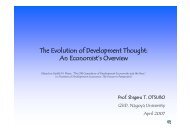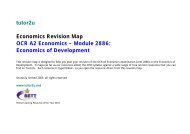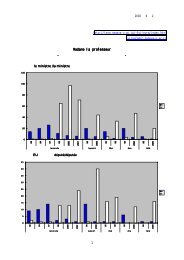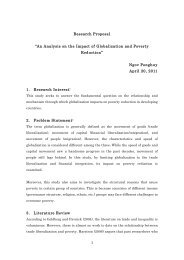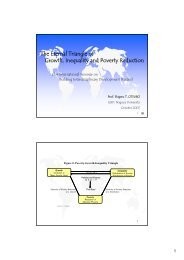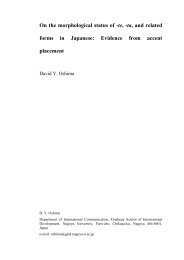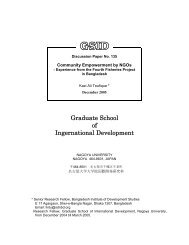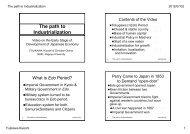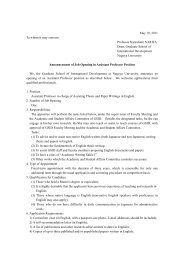Report
Report
Report
You also want an ePaper? Increase the reach of your titles
YUMPU automatically turns print PDFs into web optimized ePapers that Google loves.
CONSTRUCTION AND RELATED ENGINEERING SERVICES 111<br />
important is to remove restrictions under Modes 3 and<br />
4. Under Mode 3 there are some companies from the<br />
region already involved in providing construction<br />
services in collaboration with local partners. Further<br />
liberalisation in commercial presence will increase the<br />
possibility of trade in construction services at regional<br />
level. Similarly, Mode 4 needs to be made quite open<br />
by allowing entry of even low and semi-skilled workers<br />
from the region. Pakistan being the second largest<br />
market in South Asia all other countries would look at<br />
it for seeking market access for their workers. Finally<br />
there is no reason why there should be any restrictions<br />
on Mode 1. This is the mode in which India, Sri Lanka,<br />
Bangladesh and Nepal would be interested in the<br />
Pakistani market. At the same time Pakistan would be<br />
equally interested in this mode. Therefore, it would be<br />
in Pakistan’s interest if it removed all restrictions from<br />
this mode.<br />
Sri Lanka<br />
Sri Lanka undertook very limited commitments and<br />
in a few services sectors during the Uruguay Round. In<br />
fact, its sector specific commitments cover only three<br />
sectors, namely, tourism and travel related services,<br />
financial services, and telecommunications services.<br />
However, its horizontal commitments under Mode 3<br />
indicate that foreign investors may invest in Sri Lanka<br />
in any sector other than the following: moneylending;<br />
pawn brokering; retail trade with a capital of less than<br />
$1 million; businesses providing personal services other<br />
than for export of tourism; and coastal fishing. This<br />
implies that foreign investors have not been prevented<br />
from investing in the Sri Lankan construction and<br />
related engineering services sector. This has further been<br />
clarified by the provision inscribed in horizontal<br />
commitments that foreign investment of up to 40% of<br />
equity in a company proposing to carry on a business<br />
activity listed below will be automatically approved by<br />
the BOISL and foreign investment in excess of 40%<br />
(and up to 100%) will be approved by the BOISL on a<br />
case-by-case basis in consultation with the relevant state<br />
agencies. The relevant sectors are the following: construction<br />
and residential buildings; mass transportation;<br />
telecommunications; mass communications; education;<br />
professional services; freight-forwarding; travel agencies;<br />
shipping agencies. This situation will be reviewed<br />
every two years with the aim of further simplification.<br />
Further, a provision has been made that if a foreign<br />
investor incorporates a company in Sri Lanka under<br />
the Companies Act and buys land in the name of the<br />
company, there will be no liability otherwise if a foreign<br />
individual buys land then s/he will be liable to pay a<br />
tax at 100% of the purchase price. There is one more<br />
provision in the horizontal section suggesting that in<br />
the relevant sectors when a joint venture partner is a<br />
public sector enterprise, while granting access,<br />
preference will be given to foreign service suppliers/<br />
entities, which offer the best terms for transfer of<br />
technology.<br />
As regards Mode 4, the horizontal section stipulates<br />
that movement of natural persons is subject to Sri<br />
Lankan laws on immigration, consumer laws, and other<br />
relevant laws and regulations. Thus foreigners, who<br />
intend to work or to conduct business in Sri Lanka,<br />
shall have to obtain the relevant work permits in addition<br />
to complying with the immigration requirements.<br />
In light of the above provisions, it is clear that<br />
foreign investors can invest in the construction and<br />
related engineering services sector subject to the<br />
limitations inscribed in the schedule. However, this<br />
poses several problems. Lack of sectoral commitments<br />
in the sector implies that Sri Lanka has not given the<br />
due importance the sector deserves The construction<br />
sector in Sri Lanka accounts for 7% of GDP and posted<br />
strong growth rates in 2005–06, largely due to tsunami<br />
reconstruction projects (US Department of State 2007).<br />
Also, it can only be assumed that there are no<br />
commitments in Modes 1 and 2. Particularly, Mode 1<br />
is a fairly significant mode for delivery of various<br />
services in the construction sector. Similarly, there are<br />
no sector specific commitments under Mode 4 and<br />
those, which are inscribed in the horizontal section, do<br />
not make things easier as all immigration rules and<br />
regulations apply. Same view can be expressed regarding<br />
the commitments on professional services. Thus one<br />
can only assume that all professional services can be<br />
supplied but only through Mode 3. Overall, what<br />
appears from the Sri Lankan schedule is that the<br />
commitments in the sector are not only restrictive but<br />
also ambiguous.<br />
Although Sri Lanka has submitted its initial offer<br />
as part of the requirement of the ongoing round of<br />
services negotiations, its offer has not been made public.<br />
However, as already noted in the previous chapter, Sri<br />
Lanka has not included the construction services sector<br />
in its initial offer. In consequence, the sector remains<br />
one of the most restrictive under the GATS regime. Sri<br />
Lanka being an important market in the region, non-<br />
Sri Lankan South Asian service providers may be<br />
affected by not having a liberal regime in that country.




